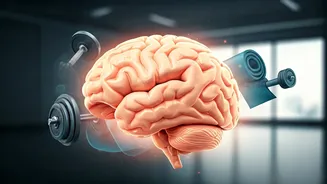Exercise's Brain Benefits
Physical activity has remarkable effects on the brain. When you exercise, your brain gets a surge of blood flow, which carries vital oxygen and nutrients.
This boost is essential for the growth of new brain cells and the strengthening of connections between existing ones, a process known as neurogenesis and synaptic plasticity. Regular exercise also encourages the release of brain-derived neurotrophic factor (BDNF), a protein that acts like a fertilizer for the brain, supporting the survival and growth of neurons. Furthermore, exercise can help in reducing inflammation and oxidative stress, both of which are detrimental to brain health and can accelerate cognitive decline. Regular exercise has been linked to a reduced risk of age-related cognitive decline and conditions like Alzheimer’s disease.
Cardio for Cognitive Health
Cardiovascular exercises, often called cardio, are fantastic for your brain. Activities like brisk walking, running, swimming, or cycling get your heart pumping and increase blood flow to the brain, providing it with more oxygen. This improved circulation aids in the formation of new brain cells and fosters better communication between different brain regions. Aim for at least 150 minutes of moderate-intensity cardio each week, which could mean a brisk walk for 30 minutes, five times a week. Engaging in cardio not only enhances cognitive function, including memory and focus, but also improves mood and reduces stress, contributing to overall brain health. Additionally, these activities can also help reduce the risk of cardiovascular diseases, which are risk factors for cognitive decline.
Strength Training Benefits
Strength training, involving exercises that build muscle, is another powerful ally for your brain. Activities like weightlifting, bodyweight exercises, or using resistance bands stimulate the release of growth factors that support brain health. Strength training not only builds muscle mass and boosts metabolism but also improves cognitive functions like memory and attention. When you lift weights, your body produces more BDNF, which aids in protecting and regenerating brain cells. Incorporate strength training into your routine at least twice a week, targeting all major muscle groups. This might include squats, push-ups, and lifting weights. This type of training helps in reducing age-related muscle loss and enhances overall physical health, which in turn benefits your brain.
Mind-Body Exercise Impact
Mind-body exercises, like yoga and Tai Chi, offer a unique blend of physical movement, mental focus, and relaxation. These practices have been shown to enhance cognitive function by improving blood flow to the brain and reducing stress levels. Yoga, in particular, combines physical postures (asanas), breathing exercises (pranayama), and meditation, promoting both physical and mental well-being. Tai Chi, a low-impact martial art, combines gentle movements with deep breathing and mental focus. These exercises encourage mindfulness, which can reduce anxiety and improve cognitive flexibility and working memory. Regularly practicing yoga or Tai Chi can lead to improved balance, coordination, and overall cognitive performance. Aim to include mind-body exercises a few times a week to reap the cognitive benefits.
Consistency and Lifestyle
The key to reaping the cognitive benefits of exercise is consistency. Make exercise a regular part of your daily or weekly routine, just like brushing your teeth. Consistency allows your brain to adapt and benefit from the positive effects of physical activity. In addition to exercise, consider other lifestyle factors that support brain health. Eating a balanced diet rich in fruits, vegetables, and omega-3 fatty acids is crucial. Getting enough sleep, managing stress, and staying socially active also play vital roles in maintaining cognitive function. Combining regular exercise with a brain-healthy lifestyle provides the best chance of keeping your mind sharp and reducing the risk of cognitive decline. Always consult your doctor before starting any new exercise routine, especially if you have existing health conditions.





















